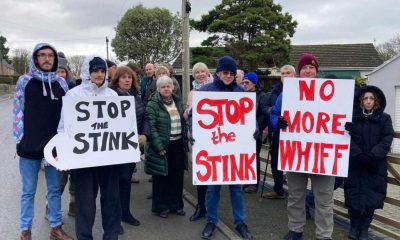Farming
Clear vision for the future of farming
 “NFU CYMRU has a vision for a productive, profitable and progressive agricultural industry in Wales. We have a favourable climate and a nation bursting at the seams with passionate, dedicated and skilled farmers,” Stephen James, NFU Cymru President, told the Wales Farming Conference.
“NFU CYMRU has a vision for a productive, profitable and progressive agricultural industry in Wales. We have a favourable climate and a nation bursting at the seams with passionate, dedicated and skilled farmers,” Stephen James, NFU Cymru President, told the Wales Farming Conference.
Mr James said: “As farmers we are proud of our role, first and foremost as food producers, being the cornerstone of the £6 billion Welsh food and drink industry and custodians of a countryside that we have created, cared for and continue to manage which not only supports a diverse range of species, habitats and ecosystems but also underpins a tourism industry that is worth nearly £2 billion to the economy of Wales.”
At the Wales Farming Conference, held on the Royal Welsh Showground, the Deputy Minister, Rebecca Evans, launched the Strategic Framework for Welsh Agriculture consultation document. The framework proposals have been developed jointly between Welsh Government and the farming industry.
NFU responds to future of farming proposals
Mr James said: “NFU Cymru along with other key industry stakeholders has a clear vision as to how the newly approved Wales Rural Development Programme (RDP) can be used to enhance the viability and competitiveness of our industry. Our proposals are innovative and focussed on integrating expert advice with on-farm investment to bring about widespread uptake, giving farmers the tools to drive their business forward. Crucial to the success of this framework will be Government and industry bringing these core projects to reality.”
Mr James will tell the Deputy Minister and the audience present, during his speech: “This is a difficult period for all sectors: exchange rates, retailer behaviour and commodity markets all seem to be against us at present which is why as part of this framework specific action plans must focus on how we can get the best possible returns from the market place, and this framework must interlink with the Welsh Food and Drink Strategy. Challenging targets must be set that industry and government must put all their combined resources into achieving. We must do everything possible to add value to primary produce here in Wales ensuring that all parts of the supply chain benefit.”
Mr James concluded: “Profitability is the key to delivering a prosperous, resilient industry and to achieve this we need to ensure maximum returns from the market place at the same time as making sure that what we produce is produced as efficiently as possible.”
FUW: PARTNERSHIP WORKING ESSENTIAL
FUW president Emyr Jones told delegates that Welsh farmers are facing the most challenging and difficult period for a decade, as a severely depleted CAP budget, coupled with ongoing uncertainty over what form the Basic Payment Scheme will take, added to extreme pressures caused by a crash in farm gate returns and farm incomes.
“Put simply, farming once again finds itself in depression, and the anger out there amongst the industry is evident,” said Mr Jones.
Describing the Strategic Framework for Welsh Agriculture consultation document launched by the Deputy Minister at the conference, Mr Jones said it contained aspirations for agriculture which few could disagree with, especially given the difficulties currently facing the industry, with agricultural prosperity and profitability being at the core of the framework.
Comparing the document with previous strategies, Mr Jones told delegates that “I’m glad to say that the strategy framework proposals being launched today differ significantly, even radically, in that, if adopted, this is not some 200 page strategy document which will join the others on the shelf.”
“Thanks to the joint work of government and industry bodies, it proposes the formation of an umbrella partnership group to oversee a short and to the point list of key objectives, most notably achieving and sustaining profitability.”
However, Mr Jones warned that the ability to influence many key factors which would help achieve these objectives were limited.
“We cannot control oil prices or exchange rates, and only God can change the weather which can make or break a profitable year. But the Rural Development Programme is one key toolbox we do have at our disposal. For our industry, and in particular our most important food producers who, whatever the final decision on the Basic Payment model is will lose the most significant amounts of money, the RDP is a lifeline.”
Mr Jones reminded those present of former minister Alun Davies’ commitment to using RDP funds to invest in the future of agriculture and equip it to cope with reductions in financial support and market failure, and welcomed the Deputy Minister’s commitments to strategic initiatives aimed at the red meat and dairy industries in particular.
“I welcome the Deputy Minister’s commitments to strategic initiatives aimed at the red meat and dairy industries in particular, and would urge Welsh Government to ensure that the partnership approach which it has signed up to is adopted when it comes to putting more flesh on the bones of the RDP so we can achieve the key objectives identified in this document, most importantly the profitability and prosperity of agriculture, without which all other objectives for our rural communities and landscapes become unattainable and irrelevant.”
MINISTER LAUNCHES MAJOR CONSULTATION
Delivering a keynote speech, Deputy Minister for Farming and Food, Rebecca Evans presented proposals for a new strategic framework for Welsh Agriculture.
These proposals have been developed jointly between the Welsh Government, FUW, NFU Cymru, CLA Wales and other key stakeholders.
The strategic framework sets out the challenges and threats facing the agriculture sector in Wales, but also highlights the opportunities, and importantly, the need for industry and Government to work together to secure a more prosperous and resilient future for the industry.
Taking the stage with Emyr Jones, President of the FUW, and Stephen James, President of the NFU-Cymru the Deputy Minister officially launched a 12-week consultation on the ‘Strategic Framework for Welsh Agriculture’.
She said: “Our vision is of a prosperous, sustainable industry. Successful, profitable farm businesses which have long-term futures are fundamental to success. We want an industry that is forward looking; uses best practice and works to safeguard and enhance soil, water and the natural environment – the bedrock of farm production.”
The Deputy Minister added that the Rural Development Programme, which was approved by the European Commission at the end of May, will provide financial support for many of the changes needed to farming and associated rural businesses, to help realise that vision.
She said: “With a value of over £900 million to rural Wales, much of which will be funded directly by the Welsh Government, this is the largest and most ambitious RDP we have ever proposed. The emphasis will be on ‘green growth’, supporting only those actions that are good for our rural economy, good for communities, good for the environment. For agriculture in particular, the new RDP will make significant, integrated investments in skills and knowledge, business development, fostering collaboration and improved land management. Our guiding principles are that we will achieve much more by working together and that farming must be a sustainable industry in the widest sense. The Welsh Government and its partners look forward to your response about how you want to take our industry forward.”
The deadline for responses is August 27 and the consultation is available on gov.wales
Farming
Welsh farmers urged to be vigilant for signs of Bluetongue
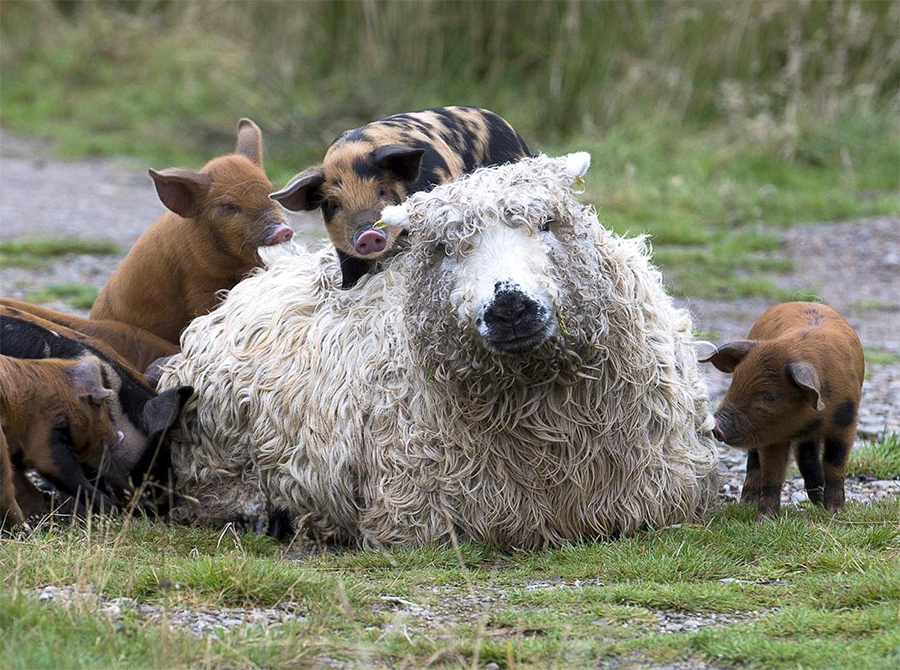
WALES’ Chief Veterinary Officer has urged farmers in Wales to be alert to signs of Bluetongue as we enter a period where animals are at an increased risk of contracting Bluetongue virus from midges.
Bluetongue does not affect people or food safety. The virus is primarily transmitted by midge bites and affects cattle, goats, sheep and camelids such as llamas, and midges are most active between April and November.
Bluetongue is a notifiable disease, so any suspect cases must be reported to the Animal and Plant Health Agency (APHA).
The impacts on susceptible animals can vary greatly – some show no clinical signs or effects at all, for others it can cause productivity issues such as reduced milk yield or reproductive losses, while in the most severe cases can be fatal for infected animals.
Farmers can help prevent the disease by:
- responsibly source livestock
- practicing good biosecurityon your premises
- remaining vigilant
Keepers considering importing animals or biological products, for example germinal products , from BTV affected countries or out of disease control zones should consult their vet to check if this is permitted, and on the risks of doing so. This should always be done before deciding to import or move animals.
All businesses should have a contingency plan for both responding to disease outbreaks on their premises and if they might be in a disease control zone. Contingency plans should include details of where animals are normally slaughtered to check that abattoir is designated.
Richard Irvine, Wales’ Chief Veterinary Officer, said: “As we enter this period where animals are more at risk from Bluetongue from midges, I would urge all keepers to take action now to protect their herds and flocks to keep disease out, be aware of how to spot Bluetongue and report any suspected cases immediately”.
“Wales has never had a case of Bluetongue – but – with past cases in England and in Europe we are encouraging people to be vigilant and prepared for Bluetongue to strike again.”
Your local Animal and Plant Health Agency (APHA) office should be contacted immediately on 0300 303 8268 if you suspect Bluetongue in your animals. APHA vets will investigate suspected cases.
Further information and resources on the current bluetongue situation are also available on the Ruminant Health and Welfare website.
Farming
Langdon Mill Farm lodges plans for big new development

One of Pembrokeshire’s largest dairy farms, which has a 2,000-strong dairy herd, has submitted a scheme for new calf buildings to “reduce reliance on third-party farms”.
Hugh James of Langdon Mill Farms Ltd has applied for permission for a calf building and weaned calf building, and associated yard areas, at Langdon Mill Farm, near Jeffreyston, Kilgetty.
A supporting statement, through agent Reading Agricultural Consultants, said: “Langdon Mill Farm is a dairy unit extending to approximately 1,215ha, comprising 283ha owned land and 730ha rented, located approximately 1km north of the village of Jeffreyston.
“A further 162ha is used by the business to spread slurry under informal agreements. The holding currently has a milking herd of approximately 2,000 cows, which are housed indoors for the majority of the year, with dry cows [cows that are not lactating, prior to calving] and heifers grazed outdoors when weather and soil conditions permit.
“There has been significant investment in buildings and infrastructure at the farm over the last decade in respect of cattle accommodation, slurry storage, milking facilities, Anaerobic Digestion (AD) plant and feed storage. The unit is efficient, achieving yields of more than 10,000 litres/cow/year, with cows being milked three times/day in the 60-point rotary parlour.
“Langdon Mill Farm currently directly employs 21 full-time, and three part-time staff (including the applicants). Of these, four live on site in the two dwellings opposite the farm, with the remaining staff living in the locality.”
urrently, calves are reared at Langdon Mill Farm for two months before being transported off-site to be reared at a number of third-party farms in the area.
At 22 months the in-calf heifers are brought back to the maternity building to calve, and then are introduced into the milking herd.
The proposed 61.2m long calf building is required to accommodate young-stock, following separation from the cows, to two-months, with the 164.8m weaned calf building to be used for calves from two months to seven months. Following the construction of the new calf accommodation, the existing building would be used for machinery and straw storage.
Currently, weaned calves are transported by tractor and cattle trailer to be reared at a farm in Cresselly, approximately 2.4km from Langdon Mill Farm.
The application says the proposals would “clearly make the enterprise more financially robust by reducing reliance on third party farms,” adding: “Despite the scale of the new buildings, their relationship to the existing dry cow/maternity building and proposed anaerobic digestion plant would ensure that landscape impact associated with the proposed development would not be significant.”
The application will be considered by planners at a later date.
Farming
Transition milk trial targets calf health at Pembrokeshire dairy farm
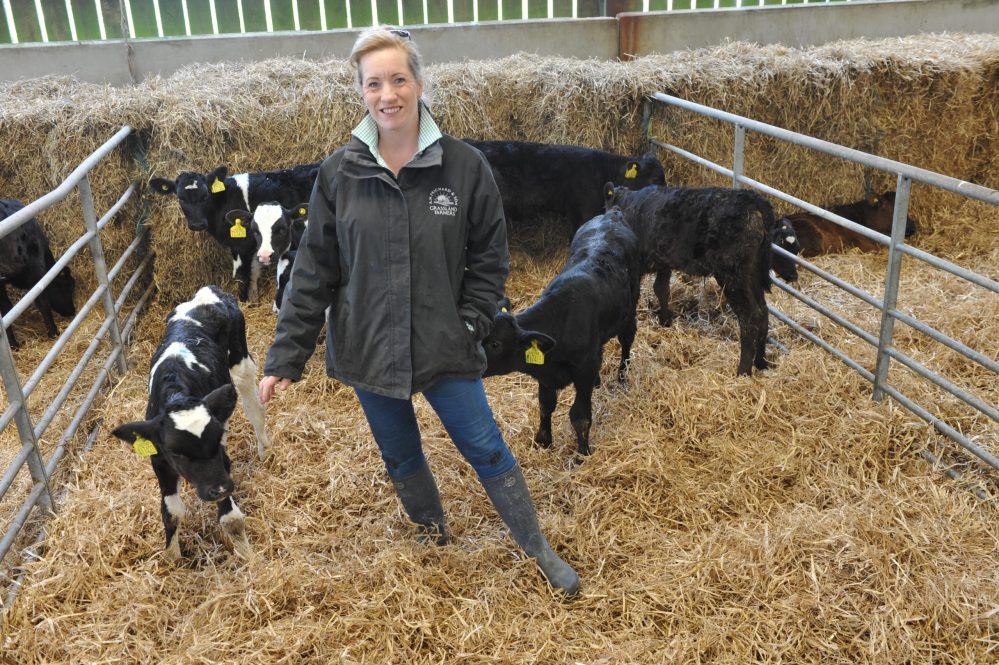
A PEMBROKESHIRE spring-calving dairy farm is introducing a new feeding system for newborn calves in what is to be thought the first trial of its kind in a large-scale herd.
Will and Alex Prichard are feeding enriched pasteurised transition milk to calves in their first 10 days of life rather than abruptly transitioning them to whole milk or milk powder.
Research has shown that feeding transition milk to young calves vastly improves their digestive system’s ability to digest milk, with those benefits sustained to keep them healthy and thriving as they grow.
The Prichard’s, who produces milk from 500 spring calvers, were keen to trial this feeding system in their own herd at Escalwen, Letterston, in the hope of improving calf health and wellbeing.
They are doing this with support from the Farming Connect Try Out Fund, an initiative that funds individuals and groups of farmers and growers to experiment with ideas and bring them to life.
Although the health benefits from enriched pasteurised transition milk have previously been demonstrated in all-year round calving herds in the USA and Canada, it is believed to be the first time it has been trialled in a large-scale block calving herd.
Getting the correct nutrition is crucial in the early stages of a calf’s life.
Even after a few hours the animal loses its ability to absorb antibodies – there is a dramatic reduction within 10 hours of birth and, by 20 hours, that capacity has all but gone.
To establish the effectiveness of the transition milk product, calves born at Escalwen this spring are being blood tested for antibody levels.
The transition milk is also being tested for its immunoglobulin (IgG) status before and after it has been pasteurised.
If it needs enriching this is being done to raise the BRIX value to a minimum of 12.5%. It is then fed to calves during their first 10 days of life.
An optical refractometer is being used to measure milk BRIX as it gives an instant result but by the end of the study all batches of transition milk will have been tested for IgG using Radial Immunodiffusion Assay at the University of Edinburgh.
Vet Dr Ryan Davies, director of Veterinary Technical Consulting Ltd, who is providing expert input into the project, says this will enable the accuracy of milk BRIX to be determined to quantify IgG status.
“We will then assess this against the health status of the calves,’’ he says.
Mortality from neonatal calf diseases such as diarrhoea, pneumonia and navel and joint ill is being monitored and antibiotic use too, as well as daily liveweight gains – at birth, at 30-35 days and at weaning.
The Try Out project hopes to understand more about how dairy farmers with large block calving herds can consistently produce animals that are healthy, productive and have a good quality of life through optimising calf health with preventative healthcare.
More productive animals mean less carbon emissions, higher standards of animal welfare and a reduction in antibiotic usage.
Not only do Will and Alex hope to reap the benefits in their own system but that other farmers will too when the findings are shared with the industry at the end of the project.
“Having the ability to acquire extra resources at the busiest time of our year has allowed us to monitor the results of our actions in a more scientific fashion,’’ says Will.
“Funding large scale testing is telling us so much about what is happening in our own herd environment and most importantly what behaviours and protocols are driving tangible improvements in herd health and antibiotic reduction.”
They had already made big gains in improving calf health before this project got underway.
The five-year average for morbidity in their pre-weaned calves from 2018-2022 was 45%, in line with the national average of 47% – in 2023 it was reduced to 17%.
Use of the Highest Priority Critically Important Antibiotics was reduced from 1.98mg/ population corrected unit (PCU) in 2022 to zero the following year.
-

 News7 days ago
News7 days agoPolice investigating after woman found dead on beach near Pennar
-

 News7 days ago
News7 days agoPolice discover body in search for Luke Stephenson, 19
-

 News7 days ago
News7 days agoCouncillors block Milford Haven boxing event – promoter to appeal
-

 News6 days ago
News6 days agoBeautiful, funny and lovely: Family pay tribute to Sian Batchelor
-
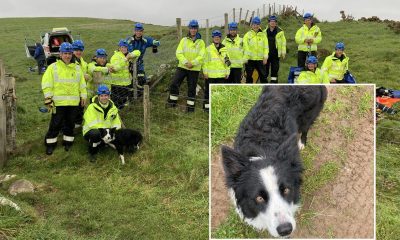
 Community2 days ago
Community2 days agoJoy as Willow rescued by coastguard after 12-day ordeal
-
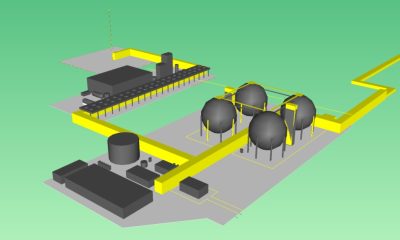
 Business2 days ago
Business2 days agoDragon LNG explores integration of LNG and CO2 liquefaction processes
-

 News4 days ago
News4 days agoBody recovered confirmed to be Luke Stephenson, say police
-

 News6 days ago
News6 days agoTigers second division Cup Champions

















